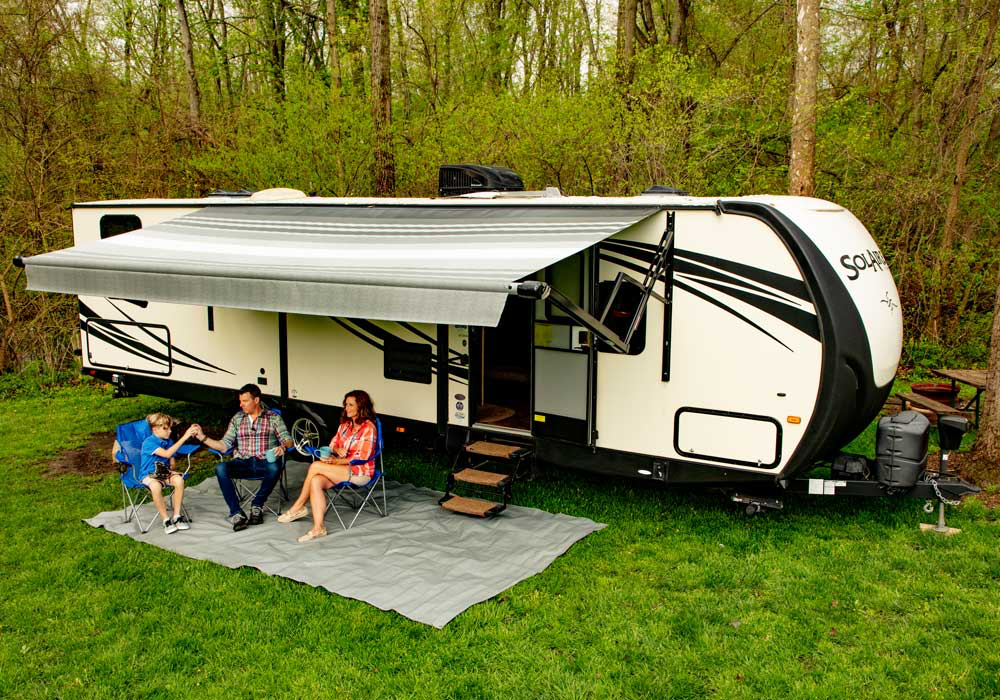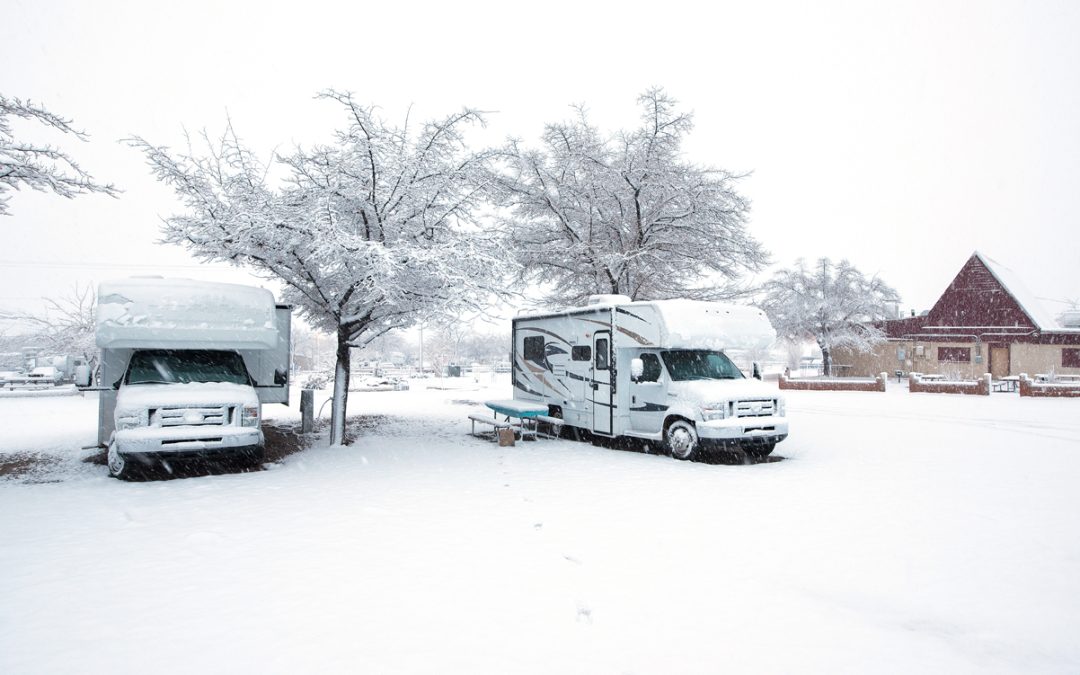As snow starts to decorate the tops of mountains and the temperatures slowly start to drop into increasingly brisk degrees, many RVers are beginning their yearly routines of getting their RVs ready for winter and putting them safely into storage.
Storing and winterizing your RV properly will help keep it in tip-top shape, ensuring that you’ll be able to get back to your warm-weather adventures on the road soon after the seasons turn.
That being said, it’s important to remember that just because your RV is out of sight, it doesn’t mean it should be out of mind. Damage can still occur while it’s not in use, and taking time to check on your RV sporadically will help prevent small issues from turning into large, expensive ones later on.
If you have the ability to store your RV in a temperature-controlled indoor facility, your chances of encountering any damage are slim, but it’s still a good idea to do a once-over when possible. If you’re storing your RV outside of your home or in a reserved outdoor lot, you’ll probably want to check up on it more often.
To help illustrate why this is important, here are a few possible drawbacks that can occur while your RV is stored away:
Mold and Mildew Spread Quickly
Between snow, sleet, and ice, moisture is especially common in winter. While part of preparing your RV for winter storage should involve ensuring all gaps or broken seals are secured as well as ensuring it’s adequately covered, even the slightest opening in your RV can pose as an entry-point for moisture.
When moisture gets into your RV, it can easily breed mold and mildew, especially if your RV is covered in a dark, damp spot that doesn’t allow for breathability. The sooner you catch mold or mildew forming, which is known to spread rapidly, the more quickly you can take action against it.
When you check on your RV, make sure to look over areas that mold/mildew would most likely be found, such as the shower, toilet, sinks, ventilation ducts, doors, windows, and pipes.
If
RV awnings get damp, mold/mildew can be found there too, so you may want to check and make sure the awning is dry. Additionally, it’s best practice to clean your entire RV before storing it, including your awning, so double check that it wasn’t rolled back up while still being wet.
Rodents Seek Shelter In the Cold and Can Cause Damage to Your RV
Just as you don’t want to be subjected to the elements, rodents also prefer to be enclosed in a space safe from the snow and wind. If they have the option, they will quickly turn vacant RVs into their winter homes.
The problem with these creatures nestling into your RV is that they can do some major damage to the interior as well as bite through vital electrical wires. You can reduce your chance of encountering a rodent problem by removing all food, including dry goods, and by securing all openings.
That being said, you still want to drop in periodically to make sure no small animals have moved in. If an infestation goes unnoticed for a lengthy period of time, you could be looking at some downright pricey repairs.
The Earlier Thefts are Reported, the Better
It’s not only rodents you have to worry about finding a way into your RV. If your RV is left stored in a fairly vacant location, occasionally dropping in to make sure the locks are still intact and the windows are securely closed can give you peace of mind.
>If do you notice that something is broken or missing, you’ll be much more successful in reporting a break-in or theft that recently occurred rather than one that could have taken place months ago.
Remember, if you’re truly worried about a theft taking place, you can always install an RV alarm system and security cameras.
Long-Term Stagnant Storage Can Create Problems With Your RV Tires
RV tire care is often an overlooked area of proper RV storage, but taking the time to keep your tires in solid shape can save you quite a bit of grief down the road.
If your tires stay sitting in the same position for long periods of time, especially in cold weather, this can result in flat spots forming. Flat spots can cause your RV to vibrate when you drive it, and in severe cases, they can lead to premature tire failure. If possible, you can move your RV periodically so that the position of the tires rotates.
Additionally, cold air causes tire pressure to deflate, which is another reason to check on your RV’s well-being throughout its time in storage. If the tires are significantly deflated for long periods of time, flat spots will be more severe and won’t work themselves out as easily. To combat this issue, check your tire pressure regularly and keep them filled to the manufacturer’s recommendation.
To be extra cautious, some RVers put their RVs up on blocks and remove the tires altogether, and then store the tires in a temperature-controlled climate. This prevents both the weight of the RV and the cold temperatures from negatively affecting the tires.
Storms Can Cause Exterior Damage
If your RV is stored outside instead of in a dry, enclosed space, exterior damage is more likely, especially in severe storms. Strong winds and blizzards can be unpredictable, allowing room for potential damage. You don’t want to find your RV has heavy exterior damage due to a broken branch, heavy snow build-up, or in the case your RV isn’t protected by a heavy-duty cover, dirt build-up and weather-wear.
Finding any exterior damage quickly will help prevent it from manifesting into something more serious, as you can take it in for necessary servicing immediately.
Better Than Safe Than Sorry
Hopefully this information helps shed some light on why it’s important to keep your eye on your ride even when it will be out of commission for the season. Your RV is your gateway to embarking on countless journeys and making incredible memories, which is why taking the time to occasionally give it a once-over is more than worth it.
If you commit to making sure all is well and remedying any necessary issues immediately, you’ll be able to get back to indulging in awe-inspiring travels as soon as possible.
In Need of a New RV Awning, Any Accessories, or A Replacement Part?
No matter what time of year it is or where you are located, Carefree of Colorado can take care of all of your RV awning needs, equip you with some of the most innovative
RV awning accessories, and provide necessary
RV awning replacement parts.
Whether you’re hitting the road tomorrow or waiting it out until spring-time, we have everything you need to create a shaded and comfortable outdoor living space, allowing your next RV trek to be your most relaxing one yet.

